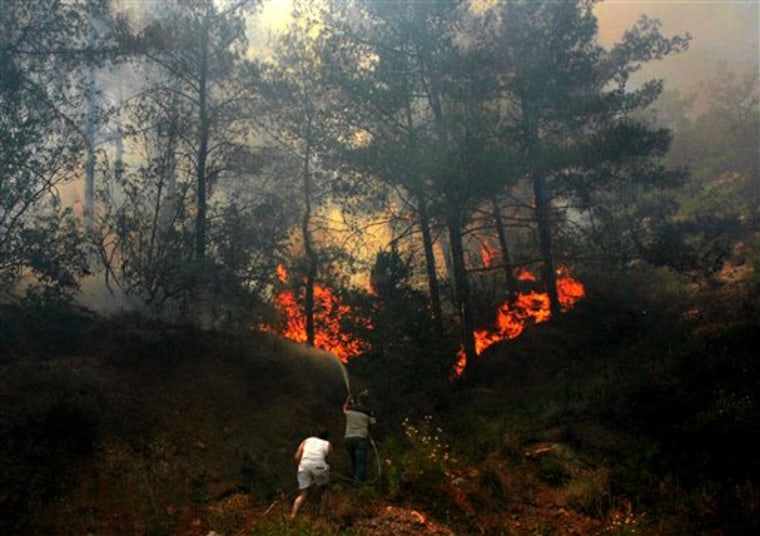Power blackouts hit 13 locations in Athens and 95 fires were reported across Greece on Wednesday amid a heat wave that has killed dozens of people in southeast Europe over the past week.
The heat wave has also hit wildlife and crops, from the humble toad in Greek lagoons to grain across the region, while fruit is ripening weeks early in Italy.
Two more deaths were reported Wednesday in Bulgaria and Cyprus. Temperatures of up to 115 degrees have killed at least 42 people in Italy and the Balkans in the last week, including 23 deaths in Romania.
Temperatures reached 111 degrees in parts of the Greek capital and the southern city of Argos, but cooler weather reached other parts of the Balkans.
Greece's state-run Public Power Corporation said there were outages in 13 parts of Athens _ one as long as 20 hours _ because of system failures. Authorities said the national grid had withstood heavy power demand for air conditioning use.
The number of heat-related deaths in Greece rose to seven, the Health Ministry said Wednesday, and the cause of five other deaths was being investigated.
Firefighters, aided by 13 air tankers and helicopters, battled a blaze in southern Greece near the coastal town of Diakofto. Ten other large fires were reported, while dozens of smaller blazes were contained or put out.
Tourists and locals fled fires sweeping the island of Poros, about two hours from Piraeus port near Athens, as firefighters, planes and a helicopter battled to control the flames.
And a blaze near Athens was headed toward a populated area, the Fire Service said.
Greece's National Weather Service said temperatures would dip below 104 degrees in most of the country on Thursday.
Some cooling
Conditions in Romania were cooled by storms early Wednesday, but authorities remained on alert to deal with the affects of the heat wave. The government ordered local authorities to provide bread and water to elderly people, allowing them to remain indoors.
Turkey and Albania also saw cooler weather. Civil servants in Istanbul with chronic illnesses or other health problems were given the day off. Picnic areas in the Mediterranean town of Antalya were placed off limits through July 2, for fear of forest fires.
On the island of Cyprus, workers at the state-run electricity company staged a three-hour strike, forcing some power cuts amid temperatures reaching 107 degrees. Firefighters there were also battling a large fire in the south of the island.
In southern Italy, after the hottest spring in nearly two centuries, this year's harvest of grapes and other fruit and vegetables is expected to be as much as a month earlier than usual, at the beginning of August.
The heat is "literally cooking" Sicilian lemons on the trees, said farmers' group Coldiretti, while watermelons, peppers, courgettes, peaches and tomatoes are also at risk.
Bird eggs overheating
Greece is experiencing its worst heat wave in 110 years. Its flora and fauna are suffering and environmentalists warned the scorching temperatures could have a long-term effect on animal populations and plants.
"Birds, now in their nesting period, laying eggs in exposed nests are at a very high risk," Martin Gaethlich of the Hellenic Society for the Protection of Nature said. "The eggs are overheating if left uncovered so birds have to remain on the eggs for much longer."
Several other nature groups have also raised the alarm.
Swallows are having problems finding mud for their nests, forcing them to travel further in search for their building material while frogs, toads and salamanders are seeing their habitats dry up, shortening their life span and affecting in turn those animals who feed on them.
"These are all linked to each other. With the frog and toad populations dropping, birds who feed on them have problems finding food as they stay in Greece until the autumn," Gaethlich said.
Gaethlich said Greece's unusually mild winter, coupled with a warmer than normal May and the current June heatwave, has already triggered changes that could be here to stay.
Fish stocks in rivers and lakes are dropping as water is pumped out for agricultural use due to a lack of rain, threatening a rare Greek otter which feeds on them.
"Flowers above the treeline on Mount Olympus that start blossoming in May have already competed their cycle, far too early. Among those are several rare, indigenous flowers."
"This weather creates a web of problems that will have long-term effects if it persists or if it reoccurs in the coming years," Gaethlich said.
